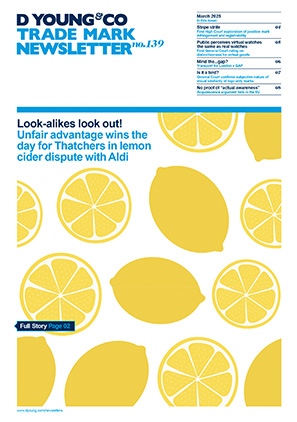A joyous decision: General Court provides guidance on evidence of reputation
The General Court has confirmed that the Board of Appeal was correct in its assessment that Jean Patou, a French fashion house, had a reputation for the mark JOY, despite its evidence indicating a downward trend of sales prior to the filing date of the European Union trade mark (EUTM) application it had challenged.
Background
In November 2019 Kneipp GmbH, a German manufacturer of natural healing products, filed an EUTM for JOYFUL BY NATURE, which included protection for cosmetics.
Patou opposed the application based on likelihood of confusion and reputation in relation to a number of earlier rights, including an EUTM for JOY, which included protection for class 3 cosmetics. Patou’s opposition was successful in light of the reputation of its JOY mark.
Kneipp appealed and the Board of Appeal partially annulled the decision in respect of services primarily related to marketing and advertising, but dismissed the appeal in respect of the other goods and services protected by the JOYFUL BY NATURE application on the basis of the strong reputation of the earlier mark, JOY. Kneipp appealed to the General Court.
General Court appeal
Kneipp criticised the Board of Appeal’s assessment that the mark JOY had a reputation at the filing date of its application (the relevant date).
Kneipp argued that the evidence filed by Patou did not demonstrate evidence of the earlier mark’s reputation in France, and that the perfume Joy by Patou is only sold by selected luxury retailers, which are not visited by a significant part of the relevant public. It argued that the low sales figures filed by Patou did not prove that the earlier mark was known to a significant part of the relevant public in France, particularly given the earlier mark had generated a low turnover of sales in France in 2016, 2017 and 2018, and turnover had declined since 2016.
The General Court noted that in order for an earlier mark to satisfy the requirement of reputation, the earlier mark must be known to a significant part of the public in relation to the goods and services protected by the mark. The relevant facts of the case must be taken into consideration, in particular, the market share held by the mark, the intensity, geographical extent and duration of use of the mark and size of the investment of the owner in promoting it. However, there is no requirement for the earlier mark to be known by a specific percentage of the relevant public or for the reputation to cover all the territory concerned, provided the reputation exists in a significant part of the territory.
While the earlier mark’s reputation must be established at the relevant date, documents created after this date should be taken into consideration if they allow conclusions to be drawn as to the situation at the relevant date. A document dated some time before the relevant date can be useful given that a reputation of a trade mark is acquired progressively and lost gradually.
Patou had filed a large amount of evidence from 2013 to 2017, including awards, articles and invoices and documents from the late 1990s, which demonstrated the historical reputation of the JOY mark. The General Court held that although sales of JOY perfumes appeared to be decreasing from 2016, and Patou had not produced evidence of significant market share as at the relevant date, this did not mean that the reputation which had accrued to the JOY mark prior to the relevant date would have vanished immediately, but instead it would have survived at the relevant date.
The General Court dismissed Kneipp’s other arguments that the Board of Appeal had erred in is assessment in relation to the remaining cumulative conditions which are required for an opposition to succeed under Article 8(5) and the grounds of reputation and dismissed the appeal.
In short
This decision is likely to be welcome news for brand owners of a famous mark who might have encountered a downward trend in sales figures over a period. When collating evidence of reputation of an earlier mark, it is worth including historical evidence of a strong reputation in the past if available, alongside more recent evidence, even if the historical evidence dates back some years before the relevant date.
Case details at a glance
Jurisdiction: European Union
Decision level: General Court
Parties: Kneipp GmbH v EUIPO & Jean Patou
Citation: T-157/23
Date: 24 April 2024

